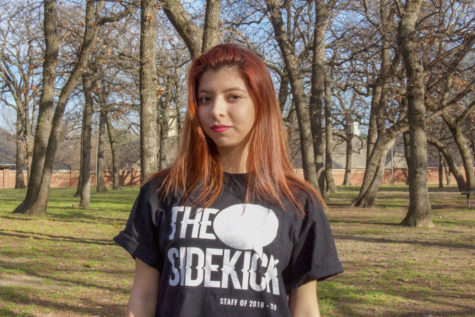From Colombia to the U.S.: Not exactly the American dream (with video)
March 18, 2019
Since moving to the U.S., I can’t help but miss Colombia every single day.
I remember getting to school early and hearing the birds chirp so pleasantly, as if you were alone in the middle of the forest.
There, my friends and I had similar experiences when it came to joining a new school. As soon as the other kids got a chance, they jumped at the opportunity to introduce themselves. Just like that, no effort required.
“In Colombia, you always feel welcome to whatever place you go,” said Coppell resident Jose Miguel Silva, who left Colombia in 2015. “People will make you feel like you’ve known them from forever even if you just met them five minutes ago.”
Even though my mom and I didn’t share his desires, my dad always dreamed of moving to the U.S. But when my mom lost her job, we were forced to explore other horizons and decided to make the move.
For the first six months, we slept on air mattresses in an almost-empty apartment in Euless. In Colombia I loved to have my friends over. But in our new home, my parents didn’t want me to invite anyone to our secluded apartment.
There was a huge disconnection between my peers and I. People here felt so distant to me, so cold. I remember hearing about “cultural shock” back in Colombia, but I did not fully comprehend what it meant until then.
“[American] groups of friends just seem inaccessible,” said Coppell High School junior Sofia Sanz, who left Mexico in 2017.
Everything seemed plain and shallow, a “Shallowville”. Conversations were small talk, and people’s personal space felt kilometers larger than in Colombia.
Oh right, miles.
In any case, after being in a country where you hug the security guard of your apartment complex on Christmas, life here felt very lonely.
The U.S. being the “country of freedom” just felt sarcastic to me, especially when I began to notice the ways Hispanics lost pride in their identities.
“I go to the store, and the girl in the cashier is evidently Hispanic,” Sanz said. “She doesn’t only look Latina and has a huge accent, but also her name is Maria. I say ‘hola’ to her, and she looks at me as if it was the worst insult. Let’s say she didn’t speak Spanish. I understand that not all people with Latino roots do, but what is so shameful about it that I need to be careful not to offend anyone by assuming they’re Hispanic?”
Stereotypes were drawn all over my country’s name, and no matter how hard I tried, it felt like people did not care about clarifying those misconceptions.
“Coming from a third world country, I would always hear the same comments,” Silva said. “People assuming I grew up in a jungle, surrounded by crime.”
I am now 17. I was 14 when I first came to the U.S., but the pressure I received from my parents to help them with typical “adult” things caused me to grow up prematurely.
“Teenengers who are refugees sometimes are put in a weird situation,” said Catholic Charities Senior Program Manager Alice Kigera, who oversees Refugee Resettlement Services. “They really are children, so they should be dependent on their parents, but sometimes they go to school and they’re the only ones [in their family] who speak English. So it all changes at home, and the parents kind of become dependent on the teenagers. Anytime they get a bill, they want the kids to interpret it. Anytime they’re talking, they want the kids to help them because they’ve adjusted more.”
Fortunately, I always found comfort in my mom’s advice and decided to give my dear Shallowville a chance.
I was amazed by how the U.S. is a little representation of the world. I remember being friends with someone from Iraq who didn’t speak English. We would spend lunch time pointing at things and telling each other how we would say it in our own languages. It was the simplest thing, but after feeling so lonely, lunch time turned into something pleasant when we rejoiced in the translation of the word “apple” in Arabic.
Things were better, but I still had that ache to return to Colombia.
Despite this, I decided to let go, and live in the moment. One day, I just learned to appreciate a bit of loneliness. I had grown up so much in such a short period of time, and that wasn’t so bad after all.
Today, I’ve reaffirmed that the U.S. may not be my future, but it will be an amazing teacher for it, just as any other experience is.












Molly McGill • Mar 27, 2019 at 1:49 pm
Absolutely loved this, I feel all Americans should read this! I never realized how different America is to other countries in the sense of social interaction, and this story opened my eyes to how people are treated when they are not originally from here. Thank you.